
In Spain, an autonomous community is the first sub-national level of political and administrative division, created in accordance with the Spanish Constitution of 1978, with the aim of guaranteeing limited autonomy of the nationalities and regions that make up Spain.

The Supreme Justice Tribunal is the highest court of law in the Bolivarian Republic of Venezuela and is the head of the judicial branch. As the independence of the Venezuelan judiciary under the regime of Nicolás Maduro is questioned, there have recently been many disputes as to whether this court is legitimate.
The Xunta de Galicia is the collective decision-making body of the government of the autonomous community of Galicia, composed of the President, the Vice-president(s) and the specialized ministers (Conselleiros).
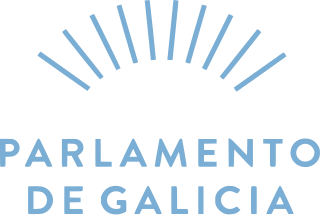
The Parliament of Galicia is the unicameral legislature of the autonomous community of Galicia, Spain. It is formed by 75 deputies. Deputies are elected every four years in ordinary period, or extraordinarily upon dissolution and call of elections by the President of the Xunta of Galicia, by universal suffrage in proportional lists with the four Galician provinces serving as constituencies.
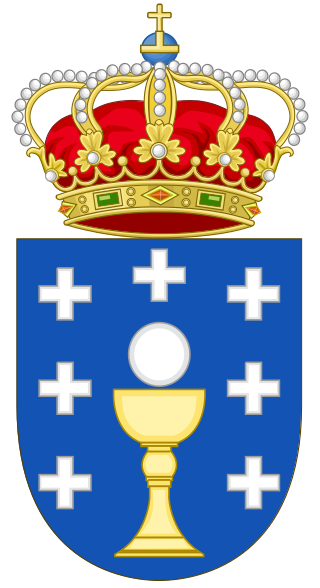
The Statute of Autonomy of Galicia of 1981 is the current basic institutional norm of Galicia. The Galician Government, Parliament and High Court of Galicia are regulated by it.

A parroquia is a population entity or parish found in the autonomous communities of Galicia and Asturias in northwestern Spain. They are entities with a territorial scope lower than municipality and have their own legal personality. They usually, but not always, coincide with the ecclesiastic divisions, as they originated on par with them.

The General Council of the Judiciary is the national council of the judiciary of Spain. It is the constitutional body that governs all the Judiciary of Spain, such as courts, and judges, as it is established by the Spanish Constitution of 1978, article 122 and developed by the Organic Law 6/1985 of the Judicial Power (LOPJ). The President of the CGJP is also the president of the Supreme Court.
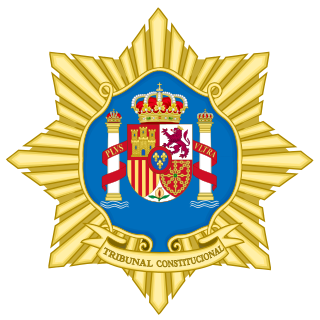
The Constitutional Court is the supreme interpreter of the Spanish Constitution, with the power to determine the constitutionality of acts and statutes made by any public body, central, regional, or local in Spain. It is defined in Part IX of the Constitution of Spain, and further governed by Organic Laws 2/1979, 8/1984, 4/1985, 6/1988, 7/1999 and 1/2000. The Court is the "supreme interpreter" of the Constitution, but since the Court is not a part of the Spanish Judiciary, the Supreme Court is the highest court for all judicial matters.

The Supreme Court is the highest court in the Kingdom of Spain. The court has original jurisdiction over cases against high-ranking officials of the Kingdom and over cases regarding the legalization of political parties. It also has ultimate appellate jurisdiction over all cases. The Court has the power of judicial review, except for the judicial revision on constitutional matters, reserved to the Constitutional Court.

Galician Unity was a Galician nationalist and social democratic political coalition formed by the Galician Workers Party, Galician Socialist Party, and the Galicianist Party in 1979.

The Supreme Court of Costa Rica is the court of greater hierarchy of Law and Justice in Costa Rica.

The Statute of Autonomy of Galicia of 1936 was a statute of autonomy for Galicia. It was voted in referendum and presented to the Spanish Parliament. Yet, it could never be implemented because of the Spanish Civil War (1936–1939) and subsequent Francoist Spain (1939–1977). The 1936 statute was drafted by the Partido Galeguista, and it is the historical precedent of the current Statute of Autonomy of Galicia of 1981.

The Judiciary of Spain consists of Courts and Tribunals, composed of judges and magistrates (Justices), who have the power to administer justice in the name of the King of Spain.
An Organic Law in Spanish law are laws related to fundamental rights and freedoms and important institutional areas as defined by the Constitution. Organic Laws must be passed by an absolute majority of the Congress of Deputies. In legal terms, organic laws are conceptually considered part of the constitution.
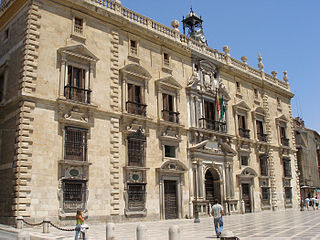
The High Court of Justice of Andalusia, Ceuta and Melilla, is the highest court of Andalusia, and for the Spanish autonomous cities of Ceuta and Melilla. Its seat is the former Royal Chancery of Granada. The TSJA has full power over all the jurisdictional orders: civil and penal law, social law, administrative disputes, and any other orders that may be created in the future.

The superior courts of justice, or high courts of justice, are courts within the judicial system of Spain, whose territorial scope covers an autonomous community, as laid down in the Organic Law of Judicial Power.

The High Court of Justice of Catalonia is the highest body and last judicial instance of the Spanish judiciary in Catalonia. Unlike the Parliament of Catalonia or the Executive Council of Catalonia, the TSJC is not a part of the Generalitat of Catalonia, the autonomous system of self-government of the community, although the Catalan government has some powers over it, especially in material resources.
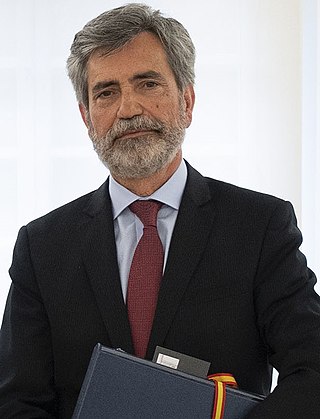
Carlos Lesmes Serrano is a Spanish magistrate and prosecutor who served as president of the Supreme Court and president of the General Council of the Judiciary (CGPJ) from 2013 to 2022. Since December 2018, he served in acting capacity in both posts, as his mandate expired at the time and the renovation of the CGPJ was blocked from then on. He is seen as a Conservative jurist with a religious background.
The Supreme Tribunal of Justice of Venezuela (TSJ) in exile is an institution that some, including the Organization of American States, consider to be the legitimate highest court of law in Venezuela and the head of the judicial branch, as opposed to the Supreme Tribunal of Justice. It was established on 21 July 2017 following the 2017 Venezuelan constitutional crisis. The TSJ's 33 members have been based in Chile, Colombia, Panama, and the United States due to the political crisis in Venezuela.

The High Court of Justice of Extremadura is the highest body and last judicial instance of the Spanish judiciary in Extremadura. Unlike the Assembly of Extremadura or the Government of Extremadura, the TSJEx is not a part of the Junta de Extremadura, the autonomous system of self-government of the community, although the Extremaduran government has some powers over it, especially in material resources.



















